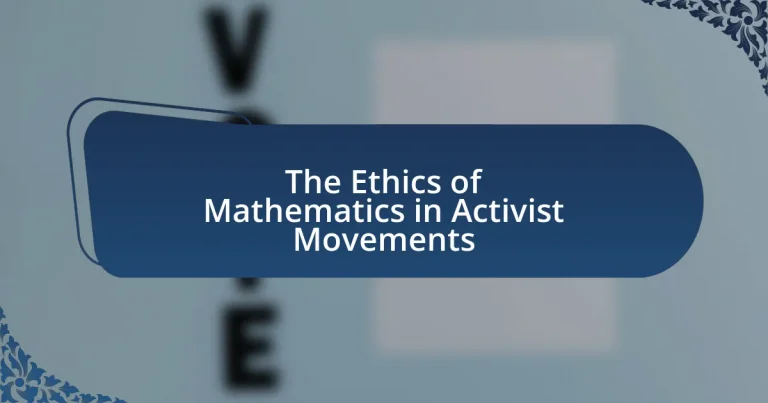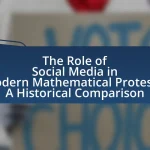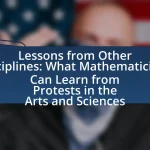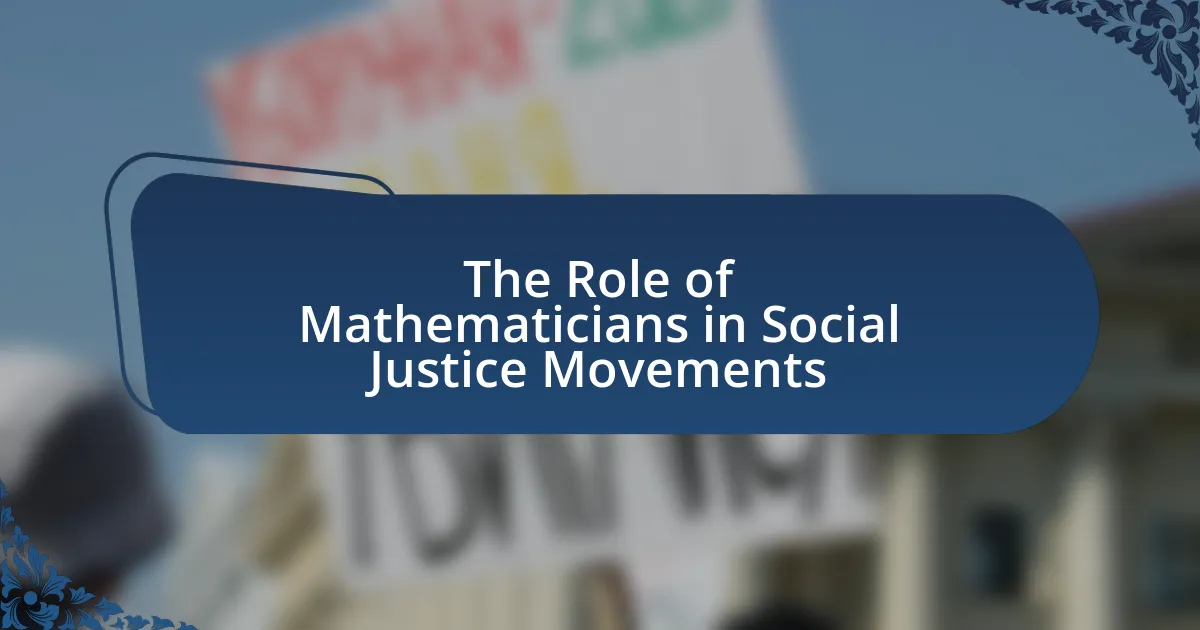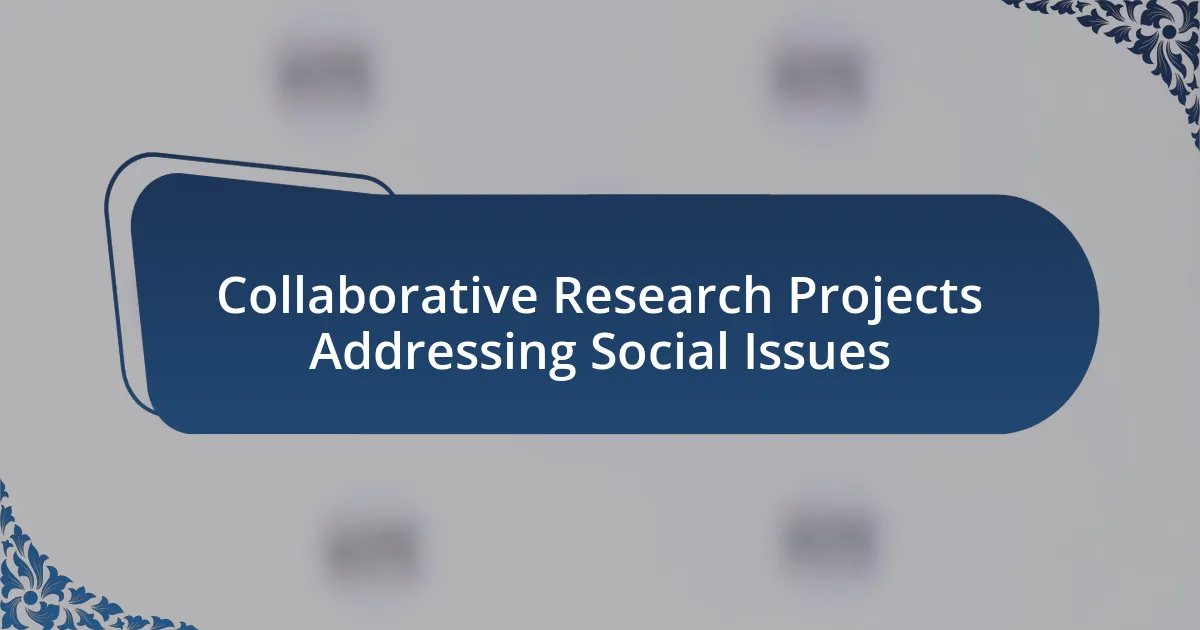The article examines the ethical implications of mathematics in activist movements, highlighting its dual role in empowering and potentially manipulating narratives. It discusses how mathematical models, such as game theory and statistical analysis, influence decision-making and enhance the effectiveness of activism by providing data-driven insights. Ethical considerations surrounding data collection, accuracy, and privacy are emphasized, along with the importance of transparency and collaboration in ensuring responsible mathematical practices. The article also outlines best practices for activists to apply ethical mathematics effectively, ensuring that their efforts promote social justice and avoid reinforcing inequalities.
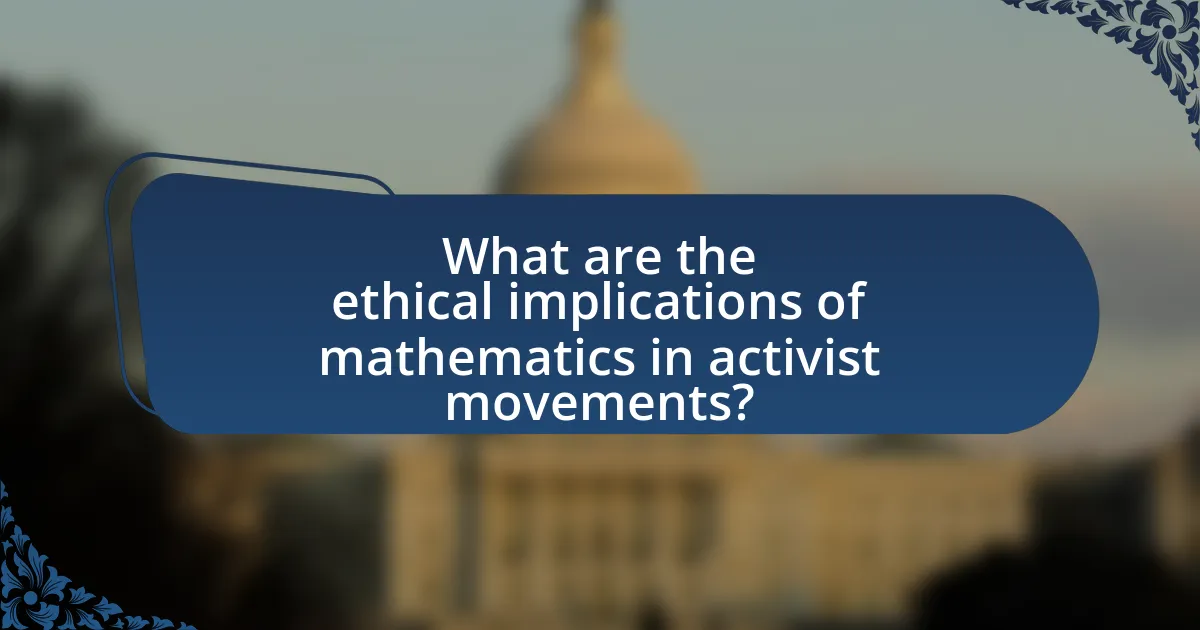
What are the ethical implications of mathematics in activist movements?
The ethical implications of mathematics in activist movements include the potential for both empowerment and manipulation. Mathematics can empower activists by providing data-driven insights that support their causes, such as statistical evidence of social injustices or environmental degradation. For instance, the use of quantitative data in campaigns like Black Lives Matter has highlighted systemic racism through crime statistics and demographic analysis. However, mathematics can also be manipulated to misrepresent facts or support misleading narratives, as seen in instances where selective data is used to distort public perception. This duality raises ethical concerns regarding the responsibility of activists to present accurate information and the potential consequences of misusing mathematical tools.
How does mathematics influence decision-making in activism?
Mathematics influences decision-making in activism by providing quantitative analysis that helps activists assess the effectiveness of their strategies and allocate resources efficiently. For instance, data analysis techniques, such as statistical modeling, allow activists to identify trends and measure the impact of their actions, which can lead to more informed decisions. A study by the Pew Research Center found that data-driven campaigns can increase engagement by up to 50%, demonstrating the power of mathematical insights in shaping successful activism. Additionally, mathematical models can simulate various scenarios, enabling activists to predict outcomes and optimize their approaches based on empirical evidence.
What mathematical models are commonly used in activist strategies?
Mathematical models commonly used in activist strategies include game theory, network analysis, and statistical modeling. Game theory helps activists understand strategic interactions and predict outcomes based on the actions of various stakeholders, as seen in social movements where cooperation and competition are analyzed. Network analysis allows activists to map relationships and influence within social networks, facilitating targeted outreach and mobilization efforts. Statistical modeling is employed to analyze data trends and measure the impact of campaigns, providing evidence-based insights that guide decision-making. These models enhance the effectiveness of activist strategies by offering structured approaches to complex social dynamics.
How do these models impact the effectiveness of activist movements?
Mathematical models significantly enhance the effectiveness of activist movements by providing data-driven insights that inform strategy and decision-making. These models enable activists to analyze social dynamics, predict outcomes, and optimize resource allocation, thereby increasing the likelihood of achieving their goals. For instance, the use of network analysis in social movements has shown how information spreads and how individuals can be mobilized effectively, as evidenced by the Arab Spring, where social media analytics played a crucial role in organizing protests. Additionally, quantitative assessments of public sentiment can guide messaging and outreach efforts, ensuring that campaigns resonate with target audiences.
Why is it important to consider ethics in mathematical applications for activism?
Considering ethics in mathematical applications for activism is crucial because ethical frameworks guide the responsible use of data and algorithms, ensuring that they promote social justice rather than exacerbate inequalities. For instance, biased algorithms can lead to discriminatory outcomes, as seen in predictive policing models that disproportionately target marginalized communities. Ethical considerations help activists avoid unintended harm and foster trust among stakeholders, which is essential for effective advocacy. By prioritizing ethics, activists can leverage mathematical tools to create equitable solutions that genuinely address societal issues.
What ethical dilemmas arise from the use of mathematics in activism?
The ethical dilemmas arising from the use of mathematics in activism include issues of data privacy, misrepresentation of statistics, and the potential for manipulation of information. Activists often rely on quantitative data to support their causes, which can lead to ethical concerns when data is collected without consent, as seen in cases where personal information is used to target individuals for campaigns. Additionally, the selective presentation of statistical data can mislead the public, as demonstrated in various social movements where figures are cherry-picked to bolster arguments, potentially distorting the truth. Furthermore, the use of algorithms in activism can perpetuate biases, as seen in predictive policing models that disproportionately affect marginalized communities. These dilemmas highlight the need for ethical considerations in the application of mathematical methods within activist contexts.
How can activists ensure ethical practices in their mathematical approaches?
Activists can ensure ethical practices in their mathematical approaches by adhering to principles of transparency, accountability, and inclusivity. Transparency involves openly sharing data sources, methodologies, and assumptions, which allows for scrutiny and validation by peers and the public. Accountability requires activists to take responsibility for the implications of their mathematical models and analyses, ensuring that they do not misrepresent data or manipulate results to fit a narrative. Inclusivity means engaging with affected communities to incorporate their perspectives and needs into mathematical frameworks, thereby avoiding biases that could arise from a lack of diverse input. These practices are supported by ethical guidelines from organizations such as the American Statistical Association, which emphasizes the importance of ethical standards in data analysis and reporting.
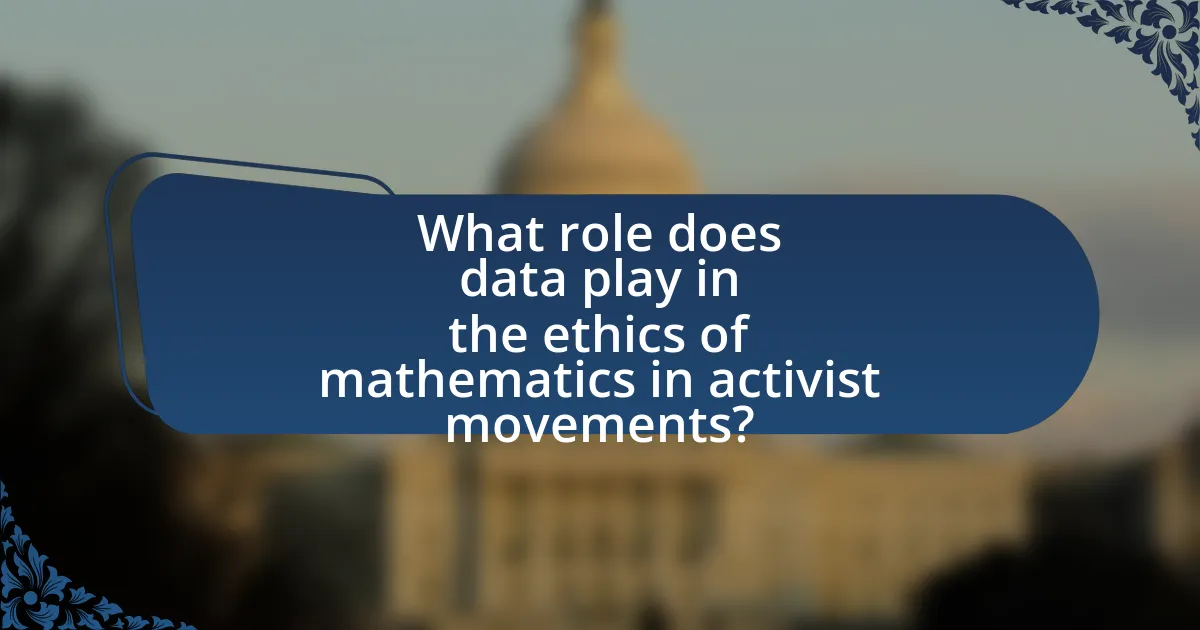
What role does data play in the ethics of mathematics in activist movements?
Data serves as a foundational element in the ethics of mathematics within activist movements by providing empirical evidence that supports claims and drives social change. In activist contexts, data is utilized to quantify social issues, such as income inequality or environmental degradation, enabling activists to present compelling arguments for reform. For instance, the use of statistical analysis in movements like Black Lives Matter has highlighted systemic racism through data on police violence, demonstrating the power of numbers in advocating for justice. Furthermore, ethical considerations arise regarding data collection methods, ensuring that data is gathered responsibly and represents marginalized voices accurately. This ethical framework is crucial, as misrepresentation or manipulation of data can undermine the credibility of activist movements and their goals.
How is data collected and used in activist movements?
Data in activist movements is collected through various methods, including surveys, social media analytics, and direct observations. Activists utilize this data to identify trends, measure public sentiment, and strategize campaigns effectively. For instance, the use of social media platforms allows movements to gather real-time data on public engagement and reactions, which can inform their messaging and outreach efforts. Additionally, organizations like the Pew Research Center provide statistical insights that help activists understand demographic shifts and public opinions, thereby enhancing their advocacy strategies.
What are the ethical considerations surrounding data collection methods?
Ethical considerations surrounding data collection methods include informed consent, privacy, and data security. Informed consent requires that individuals understand how their data will be used and agree to its collection, ensuring transparency and respect for autonomy. Privacy concerns arise when personal information is collected, necessitating measures to protect individuals’ identities and sensitive data. Data security is critical to prevent unauthorized access and breaches, which can lead to misuse of information. For instance, the General Data Protection Regulation (GDPR) in the European Union mandates strict guidelines on data collection and processing to safeguard individuals’ rights, highlighting the importance of ethical practices in data handling.
How does data accuracy affect the credibility of activist movements?
Data accuracy significantly impacts the credibility of activist movements by ensuring that claims and narratives are trustworthy and reliable. When activists present accurate data, it strengthens their arguments and fosters public trust, as seen in movements like Black Lives Matter, where accurate statistics on police violence have galvanized support and informed policy discussions. Conversely, inaccuracies can lead to skepticism and undermine the movement’s goals, as demonstrated in instances where misleading data has been used, resulting in backlash and loss of support. Thus, the integrity of data is crucial for maintaining the legitimacy and effectiveness of activist efforts.
What are the potential consequences of misusing data in activism?
Misusing data in activism can lead to significant consequences, including the erosion of public trust, the spread of misinformation, and potential legal repercussions. When activists present inaccurate or manipulated data, they risk alienating their audience and undermining their cause, as seen in instances where misleading statistics have been used to support claims, resulting in backlash and diminished credibility. Furthermore, the misuse of personal data can violate privacy laws, leading to legal actions against organizations. For example, the Cambridge Analytica scandal highlighted how data misuse can not only damage reputations but also influence electoral outcomes, demonstrating the far-reaching implications of unethical data practices in activism.
How can activists mitigate risks associated with data misuse?
Activists can mitigate risks associated with data misuse by implementing strong data protection measures, such as encryption and anonymization. These techniques safeguard sensitive information, making it difficult for unauthorized parties to access or misuse the data. For instance, a study by the Electronic Frontier Foundation highlights that encryption can significantly reduce the risk of data breaches, as it renders data unreadable without the proper decryption keys. Additionally, activists should adopt best practices for data handling, including limiting data collection to only what is necessary and regularly reviewing data retention policies to minimize exposure.
What are the implications of data privacy for activists and their supporters?
Data privacy significantly impacts activists and their supporters by safeguarding their identities and communications from surveillance and repression. When activists engage in movements, they often face threats from governments and organizations that may seek to undermine their efforts through data collection. For instance, the 2011 Arab Spring highlighted how governments used digital surveillance to track and arrest activists, demonstrating the critical need for privacy measures. Furthermore, a 2020 study by the Electronic Frontier Foundation found that 70% of activists reported concerns about their data being monitored, which can deter participation and stifle free expression. Thus, robust data privacy protections are essential for ensuring the safety and effectiveness of activist movements.
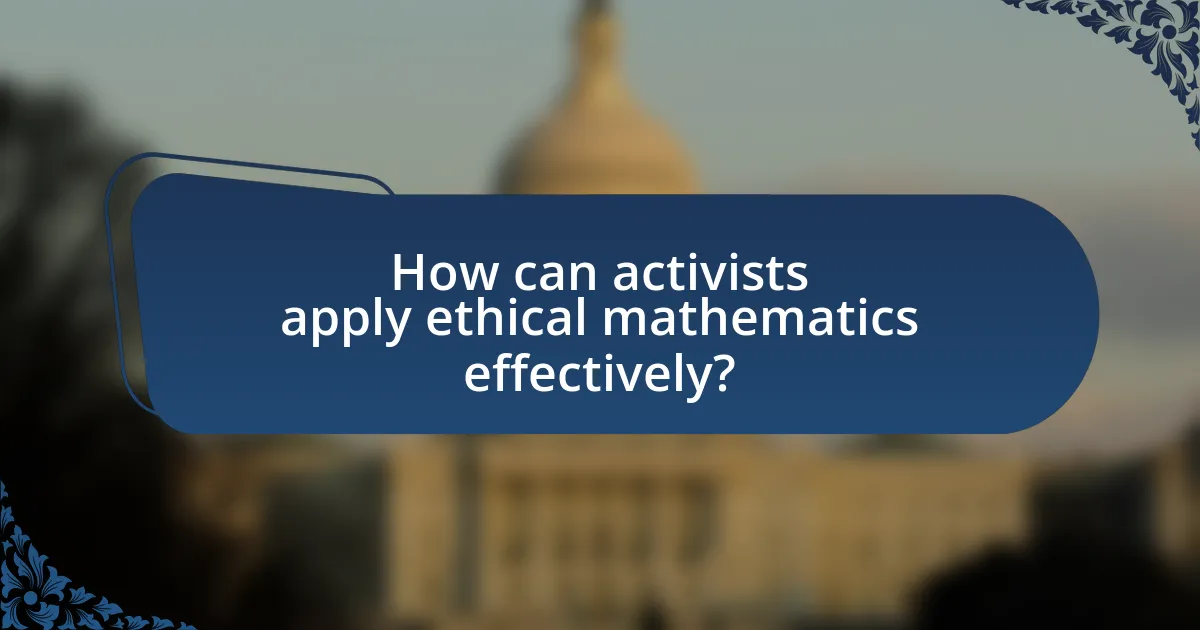
How can activists apply ethical mathematics effectively?
Activists can apply ethical mathematics effectively by utilizing data analysis to highlight social injustices and inform policy changes. For instance, they can employ statistical methods to analyze disparities in income, education, or health outcomes among different demographic groups, thereby providing concrete evidence to support their advocacy. Research shows that data-driven campaigns, such as those by the Movement for Black Lives, have successfully influenced public policy by presenting clear, quantifiable evidence of systemic inequalities. By grounding their arguments in ethical mathematics, activists can enhance their credibility and persuade stakeholders to take action based on factual, objective data.
What best practices should activists follow when using mathematics?
Activists should prioritize transparency and accuracy when using mathematics to ensure their data-driven arguments are credible. This involves clearly stating the sources of their data, using reliable statistical methods, and avoiding manipulation of figures to mislead audiences. For instance, a study published in the Journal of Statistical Education emphasizes the importance of ethical data presentation, highlighting that misrepresentation can undermine public trust and the effectiveness of activism. Additionally, activists should engage with statisticians or data scientists to validate their analyses, ensuring that their mathematical approaches are sound and ethically responsible.
How can transparency in mathematical methods enhance trust in activist movements?
Transparency in mathematical methods enhances trust in activist movements by allowing stakeholders to verify the accuracy and validity of data-driven claims. When activists openly share their methodologies, including data sources and analytical techniques, it fosters accountability and credibility. For instance, the use of transparent statistical models in social justice campaigns can help demonstrate the impact of policies, as seen in the work of organizations like the Urban Institute, which provides clear methodologies for their research. This openness not only builds confidence among supporters but also invites scrutiny, ensuring that the movement’s claims are based on sound evidence rather than manipulation.
What role does collaboration play in ethical mathematical practices among activists?
Collaboration is essential in fostering ethical mathematical practices among activists, as it enables diverse perspectives and expertise to converge on complex social issues. By working together, activists can ensure that mathematical models and data analyses are inclusive, transparent, and reflective of the communities they represent. For instance, collaborative efforts in data collection and interpretation can mitigate biases, leading to more accurate representations of social phenomena. Research has shown that collective approaches in activist movements, such as the use of participatory statistics, enhance the credibility and ethical standards of mathematical practices, ultimately empowering marginalized voices and promoting social justice.
What resources are available for activists to learn about ethical mathematics?
Activists can access various resources to learn about ethical mathematics, including academic journals, online courses, and community workshops. Notable academic journals such as “The Journal of Mathematical Behavior” and “Ethics and Information Technology” publish research on the intersection of mathematics and ethics. Online platforms like Coursera and edX offer courses on data ethics and mathematical modeling, which emphasize ethical considerations in mathematical applications. Additionally, organizations like the Data Science for Social Good initiative provide workshops and resources focused on ethical data use and mathematical practices in activism. These resources collectively support activists in understanding the ethical implications of mathematical methods in their work.
How can educational programs improve understanding of ethics in mathematics for activists?
Educational programs can improve understanding of ethics in mathematics for activists by integrating ethical frameworks into mathematical curricula and emphasizing real-world applications. By incorporating case studies that illustrate the ethical implications of mathematical modeling and data analysis in social justice contexts, these programs can help activists recognize the potential consequences of their quantitative decisions. Research shows that when mathematics is taught alongside ethical considerations, learners are better equipped to critically assess the impact of their work, as evidenced by studies like “Ethics in Mathematics Education” by Paul Ernest, which highlights the importance of ethical reasoning in mathematical practices.
What tools and technologies can assist in ethical mathematical applications for activism?
Data visualization tools, statistical software, and machine learning algorithms can assist in ethical mathematical applications for activism. These technologies enable activists to analyze data, identify trends, and communicate findings effectively. For instance, tools like Tableau and R allow for the visualization of complex datasets, making it easier to convey messages related to social justice issues. Additionally, statistical software such as SPSS can help in conducting rigorous analyses to support claims with empirical evidence. Machine learning algorithms can be employed to predict outcomes and assess the impact of various interventions, thereby guiding strategic decisions in activist campaigns. These tools collectively enhance the ability to advocate for ethical practices and informed decision-making in activism.
What are the key takeaways for ensuring ethical mathematics in activist movements?
Key takeaways for ensuring ethical mathematics in activist movements include transparency in data collection, rigorous validation of mathematical models, and consideration of the social implications of mathematical findings. Transparency ensures that stakeholders understand how data is gathered and used, fostering trust and accountability. Rigorous validation of models prevents the misuse of mathematical tools, as seen in cases where flawed models have led to misguided policies. Additionally, considering the social implications of findings helps activists avoid reinforcing existing inequalities, as demonstrated by critiques of data-driven approaches that overlook marginalized communities.
